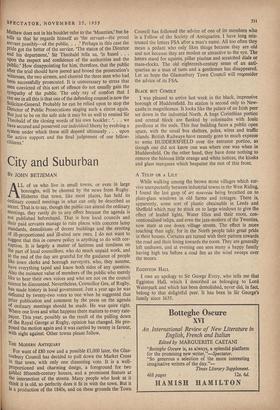City and Suburban
BY JOHN BETJEMAN LL of us who live in small towns, or even in large boroughs, will be cheered by the news from Rugby.
Hitherto that town, like most places, has held its ordinary council meetings in what can only be described as secret. That is to say, though the public can attend the ordinary meetings, they rarely do to any effect because the agenda is not published beforehand. That is how local councils and their paid servants manage to ruin places with concrete lamp standards, demolitions of decent buildings and the erecting of ill-proportioned and ill-sited new ones. I do not want to suggest that this in camera policy is anything to do with cor- ruption. It is largely a matter of laziness and tiredness on the part of local councillors, who do much unpaid work, and at the end of the day are grateful for the guidance of people like town clerks and borough surveyors, who, they assume, have everything taped and know both sides of any question. Also the nuisance value of members of the public who merely like to hear their own voices and who are not on the council cannot be discounted. Nevertheless, Councillor Gee, of Rugby, has made history in local government. Just a year ago he was defeated by twenty-two votes to one when he suggested that prior publication and comment by the press on the agenda of ordinary meetings should be made. He was quite right. Where one lives and what happens there matters to every rate- Payer. This year, possibly as the result of the pulling down of the Royal George at Rugby, opinion has changed. He pro- Posed the motion again and it was carried by twenty in favour, with eight against. Other towns please follow.
THE MODERN ANTIQUARY
For want of £80 now and a possible £1,000 later, the Glas- tonbury Council has decided to pull down the Market Cross in that town, with only one dissenting vote. It is a well- proportioned and charming design, a foreground for two gabled fifteenth-century houses, and a prominent feature at the intersection of the streets. Many people who look at it think it is old, so perfectly does it fit in with the town. But it is a production of the 1840s, and on these grounds the Town Council has followed the advice of one of its members whQ is a Fellow of the Society of Antiquaries. I have long mis- trusted the letters FSA after a man's name. All too often they mean a pedant who only likes things because they are old and not because they are modest or attractive to the eye. The letters stand for squints, pillar piscine and scratched dials or mass-clocks. The old eighteenth-century sense of an anti- quarian as a man of taste and a gentleman has disappeared. Let us hope the Glastonbury Town Council will reconsider the advice of its FSA.
BLACK BUT COMELY
I was pleased to arrive last week in the black, impressive borough of Huddersfield. Its station is second only to New- castle in magnificence. It looks like the palace of an Irish peer set down in the industrial North. A huge Corinthian portico and central block are flanked by colonnades with Ionic pavilions at the ends. This fine building faces a public open space, with the usual bus shelters, poles, wires and traffic islands. British Railways have recently gone to much expense to write HUDDERSFIELD over the entrance portico, as though one did not know one was where one was when in Huddersfield. On the other hand, they have done nothing to remove the hideous little orange and white notices, the kiosks and glass marquees which bespatter the rest of this front.
A TULIP OR A LILY While walking among the brown stone villages which sur- vive unexpectedly between industrial towns in the West Riding, I found the last gasp of art nouveau being breathed on to plate-glass windows in old farms and cottages. There is, apparently, some sort of plastic obtainable in Leeds and Sheffield which may be stuck on to large windows to give the effect of leaded lights. Water lilies and their roots, con- ventionalised tulips, and even the jazz-modern of the Twenties, now stare at one down village streets. The effect is more touching than ugly, for in the North people take great pride in their houses. Curtains are turned with their pattern towards the road and their lining towards the room. They are generally left undrawn, and at evening one sees many a happy family having high tea before a coal fire as the wind sweeps over the moors.
EGGINTON HALL
I owe an apology to Sir George Every, who tells me that Egginton Hall, which I described as belonging to Lord Waterpark and which has been demolished, never did, in fact, belong to that delightful peer. It has been in Sir George's family since 1635.


























































 Previous page
Previous page